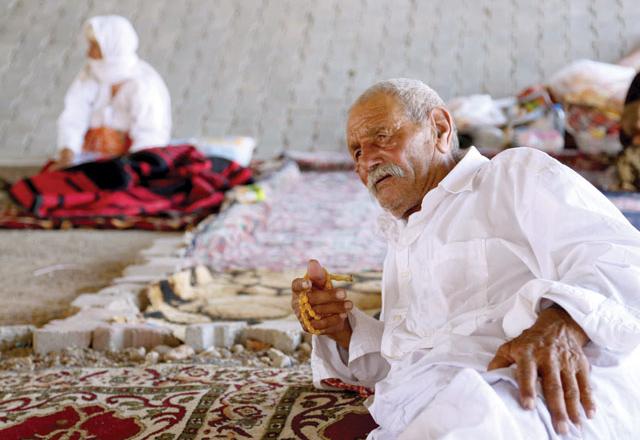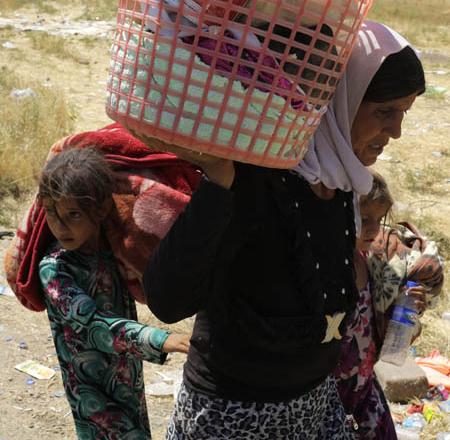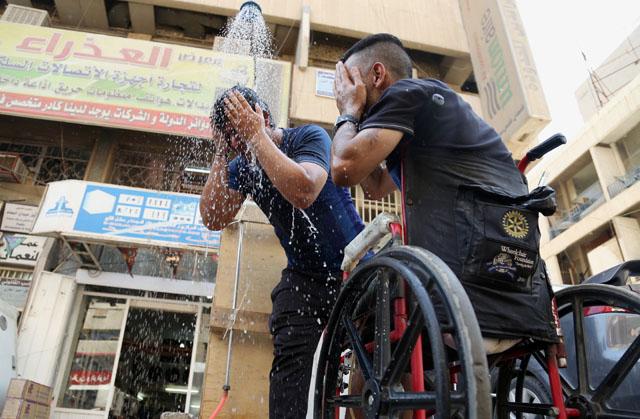You are here
Iraq’s Maliki gives up post to rival — state TV
By AP - Aug 15,2014 - Last updated at Aug 15,2014

BAGHDAD — Iraq's Nouri Al Maliki has given up his post as prime minister to Haider Al Abadi, state television reported Thursday — a move that could end a political deadlock that plunged Baghdad into uncertainty as the country fights a Sunni militant insurgency.
The Iraqiya television network said Maliki has "relinquished the post of prime minister". It did not elaborate. Afak television, Maliki's private network, ran a bulletin saying “Maliki joins the greatest men of history by giving up posts”.
The announcement comes ahead of an address Maliki was due to make later Thursday evening, according to the government.
Iraq's President Fouad Massoum named Abadi on Monday to form the next government, but Maliki had until now refused to step aside.
Maliki has been struggling for weeks to stay for a third four-year term as prime minister amid an attempt by opponents to push him out, accusing him of monopolising power and pursuing a fiercely pro-Shiite agenda that has alienated the Sunni minority.
But in a meeting of his Dawa Party on Thursday evening, Maliki agreed to endorse Abadi as the next prime minister, two senior lawmakers from his State of Law parliamentary bloc — Hussein Maliki and Khalaf Abdul-Samad — told the AP. They and two other Shiite lawmakers said Maliki would announce his endorse in his speech Thursday night. The two other lawmakers spoke on condition of anonymity to discuss the closed-door meeting.
The lawmakers said Maliki also agreed to drop a suit before the constitutional court challenging Abadi’s nomination.
The pressure intensified this week when his Shiite political alliance backed Abadi to replace him, and Massoum nominated Abadi to form the next government. Maliki for days has refused to step aside, saying the nomination violates the constitution.
Maliki had grown increasingly isolated as not only erstwhile Shiite allies but also top ally Iran, the United States and the UN backed Abadi, who has 30-days to put together a Cabinet for parliament’s approval.
The UN Security Council urged Abadi to work swiftly to form “an inclusive government that represents all segments of the Iraqi population and that contributes to finding a viable and sustainable solution to the country’s current challenges.”
The US and other countries have been pushing for an inclusive government that will ease anger among Sunnis, who felt marginalised by Maliki’s administration, helping fuel the dramatic sweep by the Islamic State extremist group over much of northern and western Iraq since June.
The extremist Islamic State group’s lightning advance across much of northern and western Iraq has driven hundreds of thousands of people from their homes since June, and last week prompted the US to launch aid operations and air strikes as the militants threatened religious minorities and the largely autonomous Kurdish region.
The UN on Wednesday declared the situation in Iraq a “Level 3 Emergency” — a development that will allow for additional assets to respond to the needs of the displaced, said UN special representative Nickolay Mladenov, pointing to the “scale and complexity of the current humanitarian catastrophe”.
The UN move came after some 45,000 people, members of the Yazidi religious minority, were able to escape from a remote desert mountaintop where they had been encircled by Islamic State fighters, who view them as apostates and had vowed to kill any who did not convert to Islam.
They were able to reach safety after Kurdish fighters from neighbouring Syria opened an exit corridor. US and Iraqi forces had earlier airlifted aid to those trapped.
US officials said Thursday that roughly 4,500 people remain on Sinjar Mountain, nearly half of whom are herders who lived there before the siege and have no desire to leave. The two officials spoke on condition of anonymity because they weren’t authorised to speak publicly.
The UN said it would provide increased support to the Yazidis and to 400,000 other Iraqis who have fled since June to the Kurdish province of Dahuk. A total of 1.5 million people have been displaced by the fighting.
The United States has been carrying out airstrikes in recent days against Islamic State fighters, helping fend back their advance on Kurdish regions.
French President Francois Hollande on Thursday confirmed the “imminent delivery of military equipment” to Kurdish forces in a phone call with the new Iraqi president, Fouad Massoum, Hollande’s office said. It did not specify the type or amount of equipment.
The statement said Paris would also provide more humanitarian aid. France has sent dozens of tons of aid in several deliveries this week.
In western Iraq, fighting erupted early Thursday in the militant-held city of Fallujah, about 65 kilometres west of Baghdad. The clashes on the city’s northern outskirts killed four children, along with a woman and at least 10 militants, said Fallujah hospital director Ahmed Shami.
He had no further details on the clashes, beyond saying that four other children and another woman were wounded in the violence.
It was difficult to gauge the situation in Fallujah, which has been in the hands of the Islamic State and allied militants since early January, when the insurgents seized much of the western Anbar province along with parts of the provincial capital Ramadi.
Meanwhile, eight civilians were killed in separate attacks across Baghdad on Thursday.
A bomb attached to a minibus in the central Sheikh Omar area killed four commuters and wounded 11 others, a police officer said. Another bomb went off in a commercial area in the southeastern Bayaa neighbourhood, killing two and wounding nine, another police officer said.
Two other civilians were killed and 11 wounded when two mortar rounds struck another residential area, he said.
Three medical officials confirmed the casualty figures. All officials spoke on condition of anonymity as they were not authorised to brief media.
Related Articles
Kurdish politician Fouad Massoum was named Iraq's new president on Thursday hours after an attack on a prison convoy killed dozens of people, brutally underscoring the challenges faced by the country's leaders as they struggle to form a new government.
An ever more isolated Nouri Al Maliki again protested his removal as Iraqi prime minister on Wednesday as his former sponsor in Iran publicly endorsed a successor who many in Baghdad hope can halt the advance of Sunni jihadists.
Iraqi soldiers backed by Shiite militias fought Sunni rebels for control of a military base northeast of Baghdad on Saturday as a UN envoy warned of chaos if divided lawmakers do not make progress on Sunday towards naming a government.













